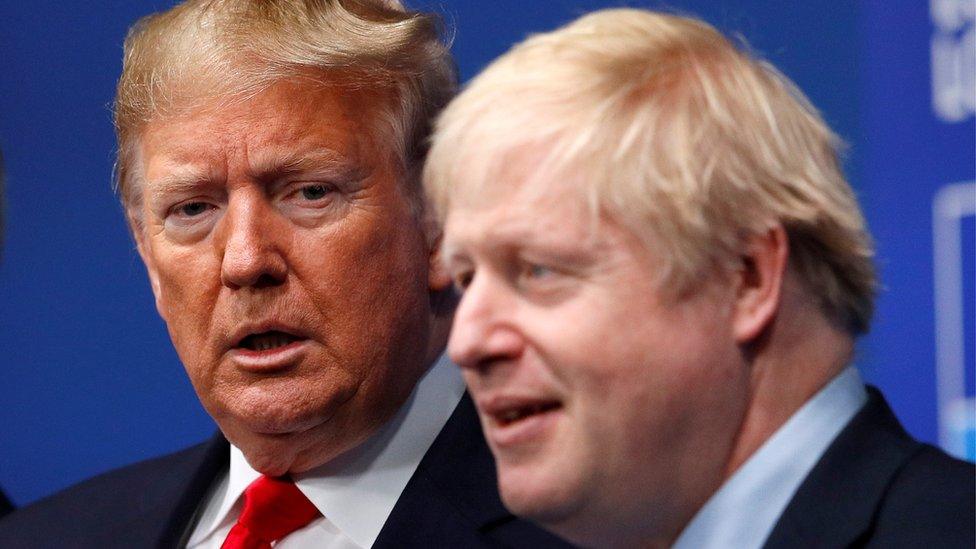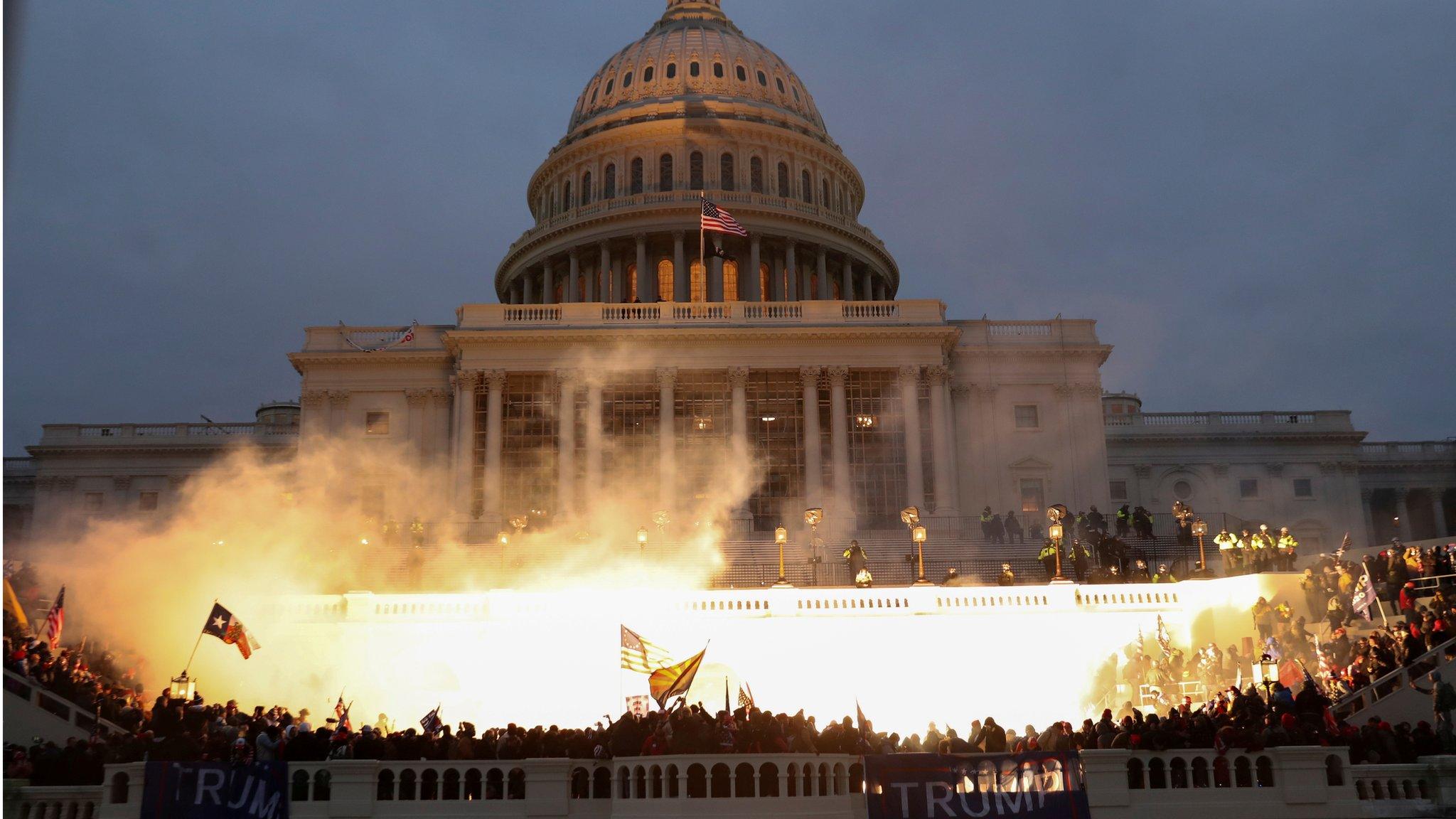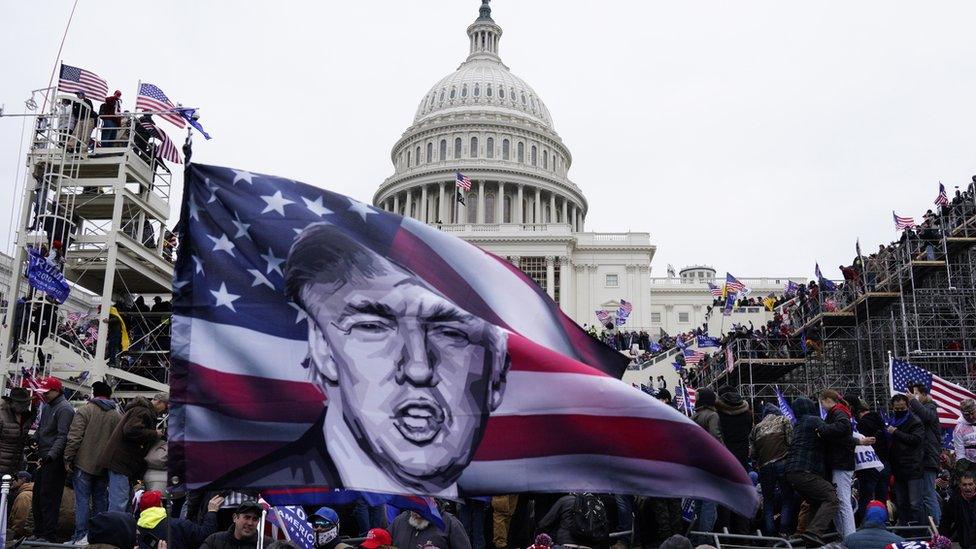Capitol siege: Trump's words 'directly led' to violence, Patel says
- Published
Priti Patel says Donald Trump was wrong for not condemning the violence
Donald Trump's comments "directly led" to his supporters storming Congress and clashing with police, Home Secretary Priti Patel has said.
Four people have died after a pro-Trump mob stormed the building in a bid to overturn the election result.
President Trump had urged protesters to march on the Capitol after making false claims of electoral fraud.
Ms Patel said the president's words had fuelled the violence and he "didn't do anything to de-escalate that".
Earlier, Prime Minister Boris Johnson condemned the "disgraceful scenes" and called for a "peaceful and orderly transfer of power".
Mr Trump has since said there will be an "orderly transition" to Democrat Joe Biden, whose November election victory has now been certified by US lawmakers.
But he added that he continued to "totally disagree" with the outcome of the vote, repeating his unsubstantiated claims of electoral fraud.
'Awful beyond words'
Hundreds of the president's supporters stormed the Capitol - where lawmakers were meeting to confirm Mr Biden's election victory - and staged an occupation of the building in Washington DC.
Both chambers of Congress were forced into recess, as protesters clashed with police and tear gas was released.
Ms Patel told BBC Breakfast the scenes were "awful beyond words".
The home secretary said: "His comments directly led to the violence, and so far he has failed to condemn that violence and that is completely wrong."
She added: "He basically has made a number of comments yesterday that helped to fuel that violence and he didn't actually do anything to de-escalate that whatsoever... what we've seen is completely unacceptable."
The home secretary added that America "needs to move on" and have the transition of power from Mr Trump to Mr Biden.
A woman died after being shot by police, and three others died as a result of "medical emergencies", local police said.
Politicians across the UK's political parties lined up to condemn the scenes in Washington.
Mr Johnson tweeted, external: "The United States stands for democracy around the world and it is now vital that there should be a peaceful and orderly transfer of power."
Labour leader Sir Keir Starmer said it was a "direct attack on democracy," whilst Scottish First Minister Nicola Sturgeon called the events "utterly horrifying".
Foreign Secretary Dominic Raab said there was "no justification for these violent attempts to frustrate the lawful and proper transition of power".
Police place US Capitol Building on lockdown after Trump supporters breached security lines
But senior Welsh Conservative Andrew RT Davies has been criticised after comparing the rioting to politicians who supported a second referendum on Brexit.
Mr Davies, a member of the Welsh Parliament, later tweeted that "violence must never be tolerated".
Friend of President Trump and leader of Reform UK - formerly the Brexit Party - Nigel Farage tweeted: "Storming Capitol Hill is wrong. The protesters must leave."
President Trump later called on his supporters to "go home", while continuing to make false claims of electoral fraud. Twitter and Facebook later froze his accounts.

Donald Trump and Boris Johnson at a Nato summit in 2019
Meanwhile, Work and Pensions Secretary Therese Coffey has defended the prime minister's response to the rioting.
Asked on ITV's Peston programme why Mr Johnson hadn't criticised Mr Trump, she said: "The prime minister has been clear tonight that we need a peaceful and orderly transition."

It is a truism of British diplomacy that every occupant of 10 Downing Street has to get on with every occupant of 1600 Pennsylvania Avenue, regardless of their politics or character.
Personal consideration is pushed aside.
What matters is the national interest and staying close to one of Britain's closest allies.
Thus even now, even after Donald Trump's incitement of the Capitol mob, even though there are less than two weeks until the inauguration, even as close Republican allies jump ship, Boris Johnson and Dominic Raab were reluctant to criticise the president by name in their initial response overnight.
Yes, they condemned the violence. But of Mr Trump, not a word.
This caution was matched by the prime ministers of fellow so-called Five Eyes intelligence allies, Australia and New Zealand, both of whom also both failed to mention Mr Trump in their condemnatory tweets.
In contrast, European leaders were quick to blame the President personally. It was only this morning that a British minister, Home Secretary Priti Patel, felt able to follow suit in strong terms.
So was this natural and sensible diplomatic caution in the midst of a febrile crisis?
Or was this, as some Labour figures are already claiming, a function of the closeness between the current UK government and the Trump administration?
It was only a few weeks ago that the Defence Secretary, Ben Wallace, told The Sun that he would miss Donald Trump, external because he was a good friend to Britain.
Whatever one's views, it is certainly the case that the British government is seen on the international stage by some has having ideological proximity to Mr Trump.
Changing that reputation is seen by many diplomats as a priority in the months ahead, a task made more urgent by events overnight.
- Published7 January 2021

- Published7 January 2021
